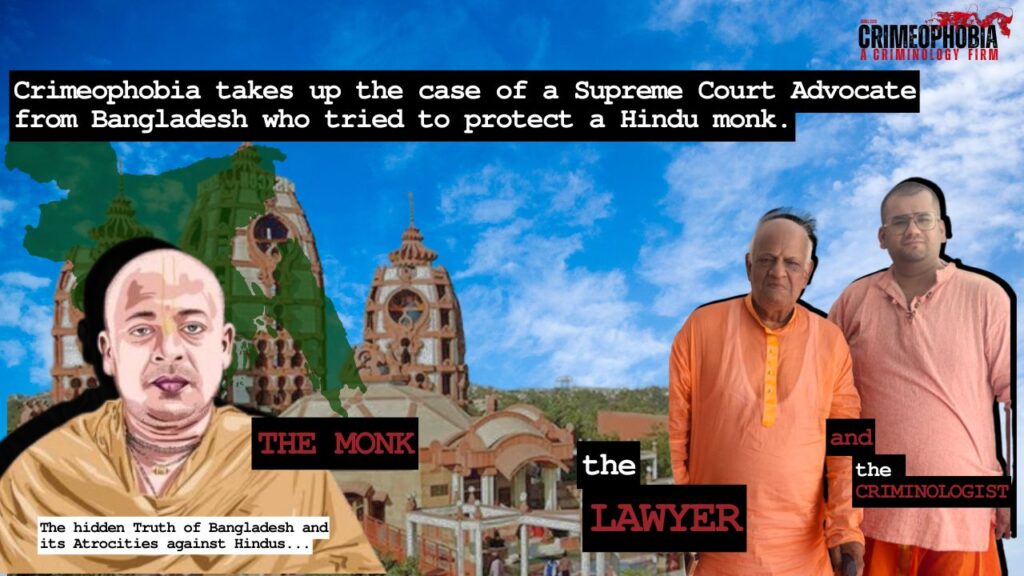
The Monk, the Lawyer, and the Criminologist: Crimeophobia takes up the case of a Supreme Court Advocate from Bangladesh who tried to protect a Hindu monk
In a deeply sensitive and increasingly controversial case that brings to light the plight of religious minorities in Bangladesh, Advocate Rabindra Ghosh—a seasoned lawyer of the Supreme Court of Bangladesh—has emerged as a fearless defender of justice. Known for his unshakable commitment to human rights and legal advocacy for persecuted Hindus, Advocate Ghosh has been at the forefront of defending jailed Hindu monk Chinmoy Krishna Das, who has been detained under unclear and allegedly fabricated charges.
Advocate Ghosh, a highly qualified legal professional and former practicing lawyer at the Supreme Court of Bangladesh, is also the Founder President of the Bangladesh Minority Watch (BDMW)—a leading human rights organization that has tirelessly worked to protect Hindus, Christians, and other minority communities in Bangladesh, until he was forced to flee the country due to ongoing threats, physical attacks, and targeted persecution.
Chinmoy Krishna Das, a prominent spiritual figure in Bangladesh’s Hindu community and a monk associated with ISKCON, was arrested under circumstances that have raised international concern. Advocate Ghosh, in his legal capacity, took up the monk’s defense amidst growing threats and an increasingly hostile legal environment. His dedication to protecting Das has not only endangered his own life but also exposed the broader issue of religious persecution in Bangladesh.
Criminologist Snehil Dhall, deeply moved by Advocate Ghosh’s relentless efforts and recognizing the broader implications of the case, has decided to take up Ghosh’s case not just as a human rights issue but as a matter of international justice—acknowledging that Ghosh is not only a victim but also a key witness in the fight to expose atrocities committed against Hindu spiritual leaders. This connection is even more personal and academic for Dhall, whose extensive criminology research on the Bhagavad Gita has been supported by ISKCON’s Kapildeva Das, and who counts among his Board of Advisors a senior ISKCON monk from Juhu, Mumbai. This spiritual and intellectual alignment has strengthened Dhall’s resolve to defend both Advocate Ghosh and the legacy of Chinmoy Krishna Das.
Fearing for his life and seeking safe grounds to continue his advocacy, Advocate Ghosh recently relocated to India. His voice, however, remains undeterred. At the Hindu Rashtra Shankhnath Mahotsav, held in India, Ghosh met with Criminologist Snehil Dhall, founder of the global criminology firm Crimeophobia, to explore avenues through which his concerns and cases could be amplified internationally.
During this significant meeting, both Ghosh and Dhall discussed the alarming role—or the lack thereof—played by the United Nations Human Rights Commission (UNHRC) in addressing the ongoing atrocities against Hindu minorities in Bangladesh. Dhall, who heads India’s implementation of the United Nations Convention against Transnational Organized Crime (UNTOC), noted that Advocate Ghosh’s testimony may serve as a critical piece of evidence against the recent confession made by a senior UN Human Rights Chief, who admitted to orchestrating the human rights narrative in Bangladesh in a way that obscures the real suffering of Hindus and other minority groups.
Realizing the gravity of this testimony, Criminologist Snehil Dhall has decided to take up Advocate Rabindra Ghosh’s case on an international platform. His objective is to raise the matter within the international diplomatic ecosystem, including the United Nations, thereby exposing the systematic atrocities against Hindus in Bangladesh, and addressing broader regional security concerns.
Importantly, taking up Advocate Ghosh’s case also marks the first operational step toward Criminologist Dhall’s visionary proposal for a “Transnational Sanatan Commission”—a global Hindu rights body he has demanded be created under the Government of India and United Nations oversight. Dhall was the first to officially document and file this demand as a Public Interest Litigation (PIL) in the Bombay High Court, which was dismissed after five days of reservation, citing the omnibus nature of the prayers. Despite the setback, Dhall has continued to pursue the cause with renewed vigor at the global level.
In this regard, Dhall also highlighted how terrorist infiltration from Bangladesh into Indian territory poses a major threat, especially through Bangladeshi sleeper cells operating in India—an issue that has not only been flagged by Indian intelligence but was also a key subject of discussion between Dhall and the Consulate General of Israel during the World Hindu Economic Forum.
Through this collaboration, Advocate Ghosh’s voice is no longer in isolation. Supported by Crimeophobia’s strategic interventions, legal analysis, and criminological advocacy, the case is being prepared for submission to international tribunals and watchdogs. The aim is not just justice for Chinmoy Krishna Das, but also the protection of religious freedom, national security, and human rights as mandated by global law.
As this partnership unfolds, it brings a renewed sense of urgency to address the declining conditions of minorities in South Asia, and the failure of global institutions to protect those they pledge to serve. With voices like Ghosh and Dhall leading the charge, the silence around state-sponsored discrimination and religious persecution is finally being shattered.

How come on . In this dress
Chinmay kiresna das parvu ko bina sart ka rihai hona chahiye Bangladesh government yek sant par atyachar kar rahe hai
Very well done Snehill & Chinmoy Krishna Das Ji for being the voice of the Sanatanis, God Bless 🙌 Both on their journey for justice
Whole world with monk